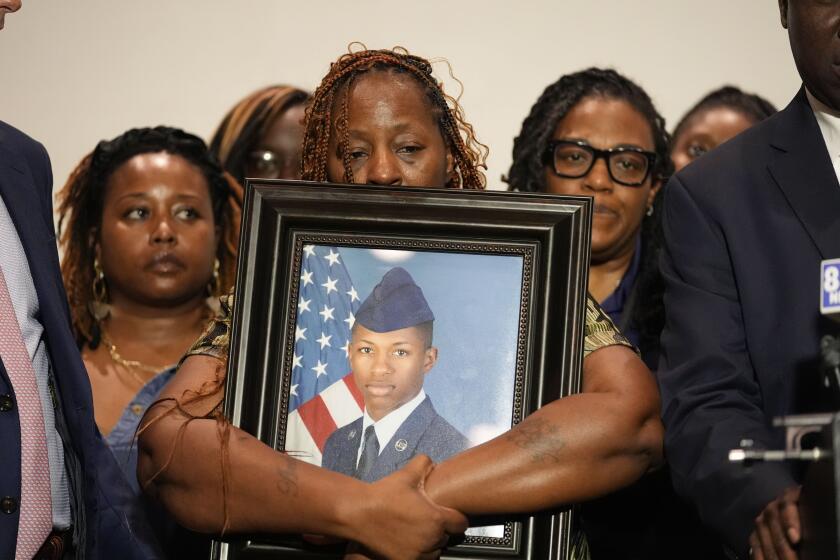Obama reaches out to fired USDA official
He didn’t reach her on the first try, but President Obama phoned former Agriculture Department official Shirley Sherrod on Thursday to apologize for her abrupt firing based on a 2 1/2-minute video clip that gave a misleading portrait of her views on race.
Obama and Sherrod spoke for about seven minutes, in which he mentioned his own exploration of race in his first book, “Dreams From My Father,” White House Press Secretary Robert Gibbs said. Obama urged her to continue speaking up for poor people. At no point did he explicitly ask her to return to the USDA, Gibbs said.
Obama had been briefed on Sherrod’s firing Tuesday morning and initially supported the decision by Agriculture Secretary Tom Vilsack, according to the White House. He reversed course after the release of the full, 45-minute videotape of Sherrod’s appearance before an NAACP group in Georgia four months ago.
The Agriculture Department e-mailed a formal job offer to Sherrod on Thursday. The position involves civil rights, though Sherrod is welcome to return to her old job if she wants it, according to an Obama administration official.
Chastened Agriculture officials have given her the choice to work in Washington or remain in Georgia, where she lives now.
In a TV interview Thursday morning, Sherrod said she wasn’t necessarily eager to take a job with her old employer. Her family also said it was wary of seeing her go back to work for the woman, department Undersecretary Cheryl Cook, who carried out the firing.
Cook had phoned Sherrod on Monday and asked her to submit her resignation, warning that her story would be shown on the talk show hosted by Fox’s Glenn Beck. Throughout the conversation, Sherrod said she was not given a chance to present her side of the story.
Sherrod’s son, Kenyatta Sherrod, said, “I have a lot of reservations about her working for her. She [Cook] should have to do some sensitivity training.”
As with many people trying to reach Sherrod, who has been making the rounds of TV talk shows, the president wasn’t immediately successful. White House operators first tried Wednesday night but couldn’t reach her and were unable to leave a message because her voice mailbox was full.
Privately, Obama administration officials have voiced discomfort with Sherrod’s many TV appearances. The call from the president came one day after Vilsack apologized to Sherrod and offered to hire her back. Vilsack said in a news conference that he made a terrible mistake in firing Sherrod based on a short video clip posted on Andrew Breitbart’s conservative website. Vilsack mistakenly concluded that Sherrod harbored racist views about a white farmer.
In fact, the full video of Sherrod’s NAACP appearance showed the opposite -- that Sherrod’s dealings with the white farmer convinced her she needed to help poor people regardless of race.
Breitbart has said that the video clip wasn’t intended to attack Sherrod but rather to show racism at an NAACP event, as evidence that the organization is hypocritical when it attacks the “tea party” as harboring racists.
During an interview on CNN, Sherrod said she would tell Breitbart that “he’s a liar. He knew exactly what effect that would have…on the conservative, racist people he’s dealing with. That’s why I started getting the hate mail. And that’s why I started getting the hate calls. He got the effect he was looking for.”
In describing the new job offer, Vilsack said Wednesday that Sherrod would be involved in the department’s effort “to turn the page on our civil rights chapter, which has been difficult.”
Sherrod understands just how difficult.
Black farmers, particularly those in the South, have long accused department officials of rejecting their loan applications, refusing aid and ignoring complaints of bias.
USDA programs are often administered by local officials and for decades were governed by the racist norms of the segregated South. The discrimination has hastened the demise of thousands of black-owned farms, civil rights advocates say.
Among those was the New Communities, a large nonprofit cooperative farm run by Sherrod and her husband, the Rev. Charles Sherrod, and operated by nine other black farmers, according to the Sherrod’s attorney, Rose Sanders. New Communities went bankrupt and the families lost the land.
In 1999, the federal government settled a class action discrimination lawsuit brought by more than 400 black farmers. In 2009, the Sherrod’s nonprofit was awarded nearly $13 million. The couple were awarded $330,000 for “pain and suffering,” Sanders said.
The Sherrods distributed some of the funds to the families who had initially farmed the land and they hope to use a portion of the money to start a similar nonprofit, Sanders said.
Sherrod was appointed as the USDA’s Georgia director for rural development shortly afterward.
Though this experience with civil rights claims made her a good job candidate in the eyes of the Agriculture secretary, for conservatives it made her a target -- again.
On Thursday, Breitbart’s website posted a recording of a radio interview with Rep. Steve King of Iowa, who said he believes the vast majority of claims filed by black farmers were fraudulent and called for a congressional investigation into the Sherrods’ award.
In a phone interview later, King said he was suspicious of the size of the award, the type of farm and the timing of Sherrod’s employment, although he said he had no reason to believe the Sherrods’ claim was fraudulent.
kathleen.hennessey@latimes.com
More to Read
Start your day right
Sign up for Essential California for news, features and recommendations from the L.A. Times and beyond in your inbox six days a week.
You may occasionally receive promotional content from the Los Angeles Times.







